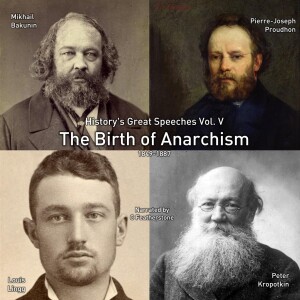
The nineteenth century saw the much-maligned philosophy of anarchism come into being. As a direct assault on the idea that people could not be trusted to rule themselves or be equal, it's message has been distorted from almost the beginning, but this is where it all began.
Mankind can rule itself without the force of top-down authority, and freedom is more than just choosing how to meet the needs and demands of capital. Inequality is structural and intentional, not inevitable and necessary.
It does not have to be this way. In solidarity, we are better.
Think for yourself, and question authority.
This is the essence of anarchism, which has a bad name and reputation because it attacks the necessity of centralised power and authority. The media archetype is Tyler Durden, filled with violence and nihilism – yet anarchism is the most positive of political philosophies, one that Jesus and Buddha both preached, stating that empathy and a rejection of authority were key to human flourishing. Neither would disagree with most early anarchists, and indeed Proudhon’s anarchism is heavily inflected with his own faith.
Proudhon, whose “property is robbery” is perhaps the most well-known anarchist slogan, lays out the conceptual foundation for key anarchist ideas. He argues that usury (charging interest) is a fundamental harm to society, that there is enough for everyone if we simply take other values to be higher than capital gain, that mutualism is inevitable, and that all governments and ideologies make the same mistake, in trying to change society from the top, when all positive change must arise from the great masses of humanity, not from their rulers.
Bakunin was one of the key members of the International Workingman’s Organisation, or First International, alongside Proudhon, Karl Marx, and Kropotkin. His speeches are about solidarity, which arises from the masses in every society, and creates the ground for a global reconfiguration.
Louis Lingg was convicted to death with six others, for being one of the ‘Chicago Anarchists’. They were executed to make a political point, based on corrupted evidence and perjury. His statement is one of contempt for the powers that be, and his belief that mankind should be free and should fight until it is.
We end with Kropotkin, who firmly believed in decentralized society. He believed that the greatest strength of mankind lies in the masses, not their rulers. Voting is an illusion to soothe the common man, not a means of change towards a better, more egalitarian, future. His speech focuses on the need for economic revolution and nationalisation for the common good.
No comments yet. Be the first to say something!